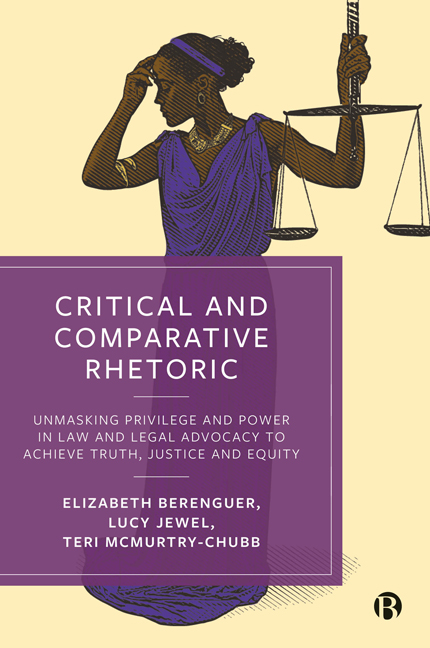 Critical and Comparative Rhetoric
Critical and Comparative Rhetoric Book contents
- Frontmatter
- Contents
- Detailed Contents
- List of Figures and Tables
- About the Authors
- Introduction
- 1 What’s Wrong with Aristotle?
- 2 Problematizing Aristotle: Renovating and Remodeling Traditional Legal Rhetoric
- 3 Shifting the Focus from the West
- 4 Multicultural Rhetorics
- 5 Reproducing the Canon, Reproducing Inequity (Traditional Rhetoric)
- 6 Interrupting the Canon
- 7 Disrupting the Canon: Multicultural Rhetorical Strategies in Action
- References
- Index
5 - Reproducing the Canon, Reproducing Inequity (Traditional Rhetoric)
Published online by Cambridge University Press: 18 January 2024
- Frontmatter
- Contents
- Detailed Contents
- List of Figures and Tables
- About the Authors
- Introduction
- 1 What’s Wrong with Aristotle?
- 2 Problematizing Aristotle: Renovating and Remodeling Traditional Legal Rhetoric
- 3 Shifting the Focus from the West
- 4 Multicultural Rhetorics
- 5 Reproducing the Canon, Reproducing Inequity (Traditional Rhetoric)
- 6 Interrupting the Canon
- 7 Disrupting the Canon: Multicultural Rhetorical Strategies in Action
- References
- Index
Summary
United States v. Bhagat Singh Thind, 43 S. Ct. 338 (United States Supreme Court 1923)
This case is about an immigration statute enacted in 1870, just after the Civil War. As you read this case, think about how the court constructed the framework of knowledge and history that supports its holding.
(All footnotes have been omitted.)
Opinion
Mr. Justice SUTHERLAND delivered the opinion of the Court.
This cause is here upon a certificate from the Circuit Court of appeals requesting the instruction of this Court in respect of the following questions:
“1 Is a high-caste Hindu, of full Indian blood, born at Amritsar, Punjab, India, a white person within the meaning of section 2169, Revised Statutes?”
“2 Does the Act of February 5, 1917 (39 Stat. 875, § 3), disqualify from naturalization as citizens those Hindus now barred by that act, who had lawfully entered the United States prior to the passage of said act?”
The appellee was granted a certificate of citizenship by the District Court of the United States for the District of Oregon, over the objection of the Naturalization Examiner for the United States. A bill in equity was then filed by the United States, seeking a cancellation of the certificate on the ground that the appellee was not a white person and therefore not lawfully entitled to naturalization. The District Court, on motion, dismissed the bill (In re Bhagat Singh Thind, 268 Fed. 683), and an appeal was taken to the Circuit Court of Appeals. No question is made in respect of the individual qualifications of the appellee. The sole question is whether he falls within the class designated by Congress as eligible.
Section 2169, Revised Statutes (Comp. St. § 4358), provides that the provisions of the Naturalization Act “shall apply to aliens being free white persons and to aliens of African nativity and to persons of African descent.” If the applicant is a white person, within the meaning of this section, he is entitled to naturalization; otherwise not. In Ozawa v. United States, 260 U.S. 178, 43 Sup. Ct. 65, 67 L. Ed. 199, decided November 13, 1922, we had occasion to consider the application of these words to the case of a cultivated Japanese and were constrained to hold that he was not within their meaning. .
- Type
- Chapter
- Information
- Critical and Comparative RhetoricUnmasking Privilege and Power in Law and Legal Advocacy to Achieve Truth, Justice, and Equity, pp. 129 - 162Publisher: Bristol University PressPrint publication year: 2023


